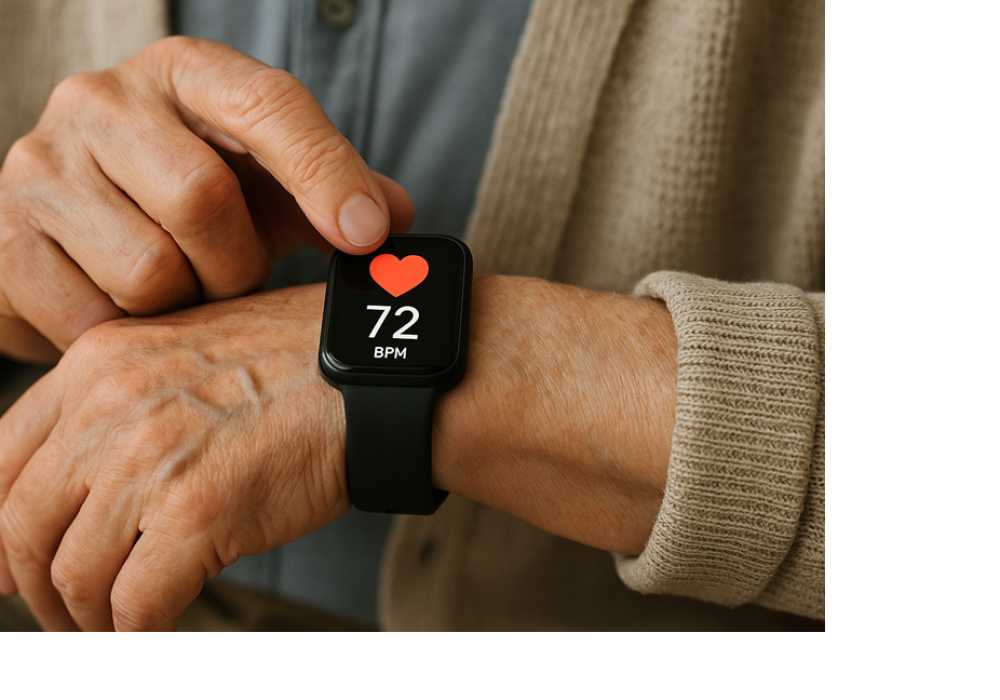Smart Watches for Seniors: Health Tracking for Independence and Wellness

Smart Watches for Seniors: Monitoring Health and Wellness
As seniors continue to embrace technology, one of the most powerful tools for enhancing wellness, independence, and peace of mind is the smartwatch. Far from being a simple step counter, today’s smartwatches are highly sophisticated health companions that can track a wide range of biometrics, from heart rate variability (HRV) to blood oxygen levels (SpO2), offering real-time insight into physical and emotional health. Whether you're living independently, in assisted living, or aging in place, a smartwatch can be a life-enhancing addition to your daily routine.
What Can Smart Watches Monitor — and Why It Matters
1. Blood Pressure
Some smartwatches now offer optical blood pressure monitoring or cuff-style sensors (like the Samsung Galaxy Watch with cuff calibration). Blood pressure is crucial for detecting early signs of hypertension or hypotension — both of which are common among older adults and linked to stroke risk, heart disease, and falls.
2. Heart Rate (HR) and Activity Heart Zones
Smartwatches continuously track resting heart rate, workout heart zones (fat burn, cardio, peak), and irregular patterns. A sudden drop or rise can signal stress, dehydration, or an underlying issue like arrhythmia. Monitoring heart rate during daily walks, pickleball games, or even chores helps ensure exercise is safe and effective.
3. Heart Rate Variability (HRV)
HRV measures the variation in time between heartbeats and reflects the balance between your parasympathetic and sympathetic nervous systems. Higher HRV is linked to better stress resilience and overall health. Seniors under chronic stress or recovering from illness can benefit from watching this metric.
4. Blood Oxygen Saturation (SpO2)
SpO2 sensors measure how well oxygen is circulating through the body. Levels below 95% may indicate breathing problems, poor circulation, or an undiagnosed condition such as sleep apnea or chronic respiratory issues — especially relevant for seniors in memory care or assisted living.
5. Sleep Tracking (REM, Deep, Light Sleep)
Modern smartwatches can break down sleep into REM, deep, and light stages, offering insight into how restorative your sleep truly is. Sleep quality impacts everything from immune function and emotional regulation to memory. Devices like the Fitbit Sense or Oura Ring are known for precise sleep analytics.
6. Steps and Activity Monitoring
Tracking daily steps encourages mobility and reduces sedentary time — key to maintaining muscle, balance, and cardiovascular health. Set movement reminders or aim for a daily goal like 5,000–10,000 steps to stay engaged and active, whether you’re living independently or in a senior community.
7. Hydration and Water Consumption
Some smartwatches or their apps allow you to log and be reminded to drink water. Dehydration in older adults can cause fatigue, dizziness, and confusion. A simple nudge to sip water throughout the day supports kidney function and brain clarity.
Best Smart Watches for Seniors
🟦 Apple Watch Series (SE or 8+)
-
Pros: Fall detection, ECG, SpO2, sleep, emergency SOS
-
Best For: Tech-savvy seniors who use iPhones
-
Link: Apple Watch for Seniors
🟩 Fitbit Sense 2 or Versa 4
-
Pros: HRV, SpO2, skin temperature, sleep staging, stress tracking
-
Best For: Seniors who prefer a user-friendly interface
-
Link: Fitbit for Older Adults
🟥 Garmin Vivosmart 5
-
Pros: Simple design, heart rate zones, SpO2, body battery
-
Best For: Active seniors who enjoy walks and hikes
-
Link: Garmin Vivosmart 5
🟨 Samsung Galaxy Watch 6
-
Pros: Cuff-calibrated blood pressure, ECG, body composition
-
Best For: Android users with a focus on metabolic health
-
Link: Samsung Health Watch
🟧 Oura Ring (Gen 3)
-
Pros: Sleep precision, HRV, temperature, SpO2
-
Best For: Seniors who prefer not to wear a watch
-
Link: Oura Ring
Smartwatch Benefits in Assisted Living, Independent Living, and Aging in Place
-
Peace of Mind for Caregivers and Loved Ones
Fall detection and emergency alerts can notify contacts immediately if an incident occurs, making smartwatches valuable in assisted living or for seniors aging in place alone. -
Encourages Routine and Structure
Reminders to take medications, hydrate, move, and rest help maintain healthy routines. -
Insight Into Daily Wellness
Sleep disruptions, rising heart rates, or low oxygen may be early signs of illness. Metrics tracked over time allow seniors, caregivers, and medical professionals to spot trends and adjust care plans accordingly. -
Reduces Hospitalizations
Early warning signs like irregular heart rhythms or high blood pressure, if caught, can prevent ER visits. -
Supports Memory and Mood
Consistent sleep and activity patterns improve memory, reduce depressive symptoms, and support emotional well-being — all essential in senior living and memory care.
Considerations When Choosing a Smartwatch for Seniors
-
Ease of Use: Look for a clear screen, intuitive menu, and large fonts
-
Battery Life: Some options last 4–10 days; others need daily charging
-
Compatibility: Check that the watch syncs with your smartphone
-
Water Resistance: Important if the wearer showers or swims regularly
-
Durability: A good strap and strong screen prevent damage from falls
Helpful Resources
-
National Institute on Aging – Exercise and Physical Activity
-
Assistive Technology for Aging in Place
Final Thoughts
Whether you’re living independently, in assisted living, or exploring ways to maintain health while aging in place, a smartwatch offers real-time support, motivation, and safety. These small devices empower seniors to take charge of their health while giving peace of mind to family and caregivers.
By embracing this technology, seniors can enjoy longer, healthier lives — all at the touch of a wrist.